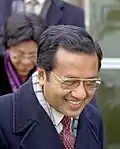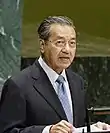Anwar Ibrahim
Dato' Seri Anwar bin Ibrahim (Jawi: أنوار بن إبراهيم; Malay: [/änwär ɪbrähiːm/]; born 10 August 1947) is a Malaysian politician who has twice served as the 12th and 16th Leader of the Opposition since May 2020 and from August 2008 to March 2015, 2nd President of the People's Justice Party (PKR) since November 2018 and 2nd Chairman of the Pakatan Harapan (PH) opposition coalition since February 2020.[3] He has served as the Member of Parliament (MP) for Port Dickson since October 2018 and the Deputy Prime Minister from 1993 to 1998 and Finance Minister from 1991 to 1998 when he was a member of the United Malays National Organisation (UMNO), the major party in the ruling Barisan Nasional (BN) coalition then.
Anwar Ibrahim | |
|---|---|
أنوار إبراهيم | |
.png.webp) | |
| 12th and 16th Leader of the Opposition | |
| Assumed office 18 May 2020 | |
| Monarch | Abdullah |
| Prime Minister | Muhyiddin Yassin |
| Preceded by | Ismail Sabri Yaakob |
| Constituency | Port Dickson |
| In office 28 August 2008 – 16 March 2015 | |
| Monarch | Mizan Zainal Abidin Abdul Halim |
| Prime Minister | Abdullah Ahmad Badawi Najib Razak |
| Preceded by | Wan Azizah Wan Ismail |
| Succeeded by | Wan Azizah Wan Ismail |
| Constituency | Permatang Pauh |
| 7th Deputy Prime Minister of Malaysia (Acting Prime Minister: 19 May 1997 – 22 July 1997) | |
| In office 1 December 1993 – 2 September 1998 | |
| Monarch | Azlan Shah Ja'afar |
| Prime Minister | Mahathir Mohamad |
| Preceded by | Ghafar Baba |
| Succeeded by | Abdullah Ahmad Badawi |
| Constituency | Permatang Pauh |
| Minister of Finance | |
| In office 15 March 1991 – 2 September 1998 | |
| Monarch | Azlan Shah Ja'afar |
| Prime Minister | Mahathir Mohamad |
| Deputy | Abdul Ghani Othman (1991–1993) Loke Yuen Yow (1991–1995) Mustapa Mohamed (1993–1995) Affifudin Omar (1995–1996) Wong See Wah (1995–1998) Mohamed Nazri Abdul Aziz (1996–1998) |
| Preceded by | Daim Zainuddin |
| Succeeded by | Mahathir Mohamad |
| Constituency | Permatang Pauh |
| Minister of Education | |
| In office 11 August 1986 – 15 March 1991 | |
| Monarch | Iskandar Azlan Shah |
| Prime Minister | Mahathir Mohamad |
| Deputy | Woon See Chin (1986–1990) Bujang Ulis (1986–1987) Leo Michael Toyad (1987–1991) Fong Chan Onn (1990–1991) |
| Preceded by | Abdullah Ahmad Badawi |
| Succeeded by | Sulaiman Daud |
| Constituency | Permatang Pauh |
| Minister of Agriculture | |
| In office 17 July 1984 – 10 August 1986 | |
| Monarch | Iskandar |
| Prime Minister | Mahathir Mohamad |
| Deputy | Goh Cheng Teik Luhat Wan |
| Preceded by | Abdul Manan Othman |
| Succeeded by | Sanusi Junid |
| Constituency | Permatang Pauh |
| Minister of Culture, Youth and Sports | |
| In office 2 June 1983 – 17 July 1984 | |
| Monarch | Ahmad Shah |
| Prime Minister | Mahathir Mohamad |
| Deputy | Rosemary Chow Poh Kheng |
| Preceded by | Mokhtar Hashim |
| Succeeded by | Sulaiman Daud |
| Constituency | Permatang Pauh |
| Chair of the Caucus on Reform and Governance | |
| Assumed office 4 December 2018 | |
| Deputy | Lim Kit Siang |
| Speaker of House | Mohamad Ariff Md Yusof (2018–2020) Azhar Azizan Harun (since 2020) |
| Preceded by | Position established |
| Constituency | Port Dickson |
| 2nd President of International Islamic University Malaysia | |
| In office 1988–1998 | |
| Chancellor | Ahmad Shah |
| Preceded by | Hussein Onn |
| Succeeded by | Najib Razak |
| Chair of the Development Committee of the World Bank and the International Monetary Fund | |
| In office March 1998 – September 1998 | |
| Preceded by | Driss Jettou |
| Succeeded by | Tarrin Nimmanahaeminda |
| President of the UNESCO General Conference | |
| In office 1989–1991 | |
| Preceded by | Guillermo Putzeys Alvarez |
| Succeeded by | Bethwell Allan Ogot |
| Member of the Malaysian Parliament for Port Dickson | |
| Assumed office 15 October 2018 | |
| Preceded by | Danyal Balagopal Abdullah (PKR—PH) |
| Majority | 23,560 (2018) |
| Member of the Malaysian Parliament for Permatang Pauh | |
| In office 28 August 2008 – 16 March 2015[1] | |
| Preceded by | Wan Azizah Wan Ismail (PKR) |
| Succeeded by | Wan Azizah Wan Ismail (PKR) |
| Majority | 15,671 (2008) 11,721 (2013) |
| In office 29 March 1982 – 14 April 1999 | |
| Preceded by | Zabidi Ali (PAS) |
| Succeeded by | Wan Azizah Wan Ismail (keADILan) |
| Majority | 14,352 (1982) 10,479 (1986) 16,150 (1990) 23,230 (1995) |
| 2nd President of the People's Justice Party | |
| Assumed office 17 November 2018 | |
| Deputy | Mohamed Azmin Ali (2018–2020) |
| Preceded by | Wan Azizah Wan Ismail |
| 2nd Chairman of the Pakatan Harapan | |
| Assumed office 24 February 2020 | |
| President | Wan Azizah Wan Ismail |
| Preceded by | Mahathir Mohamad |
| Constituency | Port Dickson |
| Personal details | |
| Born | Anwar bin Ibrahim 10 August 1947 Bukit Mertajam, Malaya (now Malaysia)[2] |
| Political party | United Malays National Organisation (UMNO) (1982–1998) People's Justice Party (PKR) (1999–present) |
| Other political affiliations | Barisan Nasional (BN) (1982-1998) Barisan Alternatif (BA) (1999-2004) Pakatan Rakyat (PR) (2008-2015) Pakatan Harapan (PH) (2015-present) |
| Spouse(s) | |
| Children | Six, including Nurul Izzah |
| Alma mater | University of Malaya (BA) National University of Malaysia (MA) |
| Signature | |
| Website | Official website |
| ||
|---|---|---|
|
2013 Malaysian general election Minister of Finance Deputy Prime Minister of Malaysia Leader of the Opposition
Pakatan Harapan Political parties
Family
|
||
However, he was removed from his post by Prime Minister Mahathir Mohamad and jailed in April 1999. Following his release in 2004, Anwar became the leading figure in the opposition and helped coalesce the opposition parties into the Pakatan Rakyat (PR), which contested the 2008 and 2013 general elections. He was the Leader of the Opposition from 2008 to 2015.
Anwar was sentenced to five-year imprisonment after a second sodomy conviction in 2015. He received a royal pardon from Sultan Muhammad V,[4] and was released from prison on 16 May 2018 in the aftermath of the Pakatan Harapan victory in 2018 general election.[5][6] He soon made a come back as a back-bencher MP by contesting and winning the Port Dickson by-election. He served on the backbenches whilst his wife, Wan Azizah Wan Ismail, served as Deputy Prime Minister during Mahathir Mohammed's second stint as Prime Minister.
Early years (1968–1982)
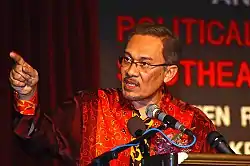
From 1968 to 1971, as a student, Anwar was the president of the National Union of Malaysian Muslim Students. Around the same time, he was also the president of the University of Malaya Malay Language Society (Malay: Persatuan Bahasa Melayu Universiti Malaya (PBMUM)). In 1971, he was a member of the pro tem committee of Angkatan Belia Islam Malaysia (ABIM) or Muslim Youth Movement of Malaysia which he co-founded. At the same time, he was elected as the 2nd President of the Malaysian Youth Council or Majlis Belia Malaysia (MBM). In 1974, Anwar was arrested during student protests against rural poverty and hunger. This came as a report surfaced stating that a family died from starvation in a village in Baling, in the state of Kedah, which was later demonstrated to be false. However, the rubber tappers in Baling were experiencing severe hardship as the price of rubber dropped in 1974. He was imprisoned under the Internal Security Act (ISA), which allows for detention without trial, and spent 20 months in the Kamunting Detention Centre. From 1975 till 1982 he served as a representative for Asia Pacific of World Assembly of Muslim Youth (WAMY).[7] Anwar Ibrahim is also the co-founder of the International Institute of Islamic Thought (IIIT) in the USA (founded 1981).[8] Anwar has been one of 4 acting directors, a board member of IIIT[9] and a trustee.[10][11] He was also a chancellor of International Islamic University Kuala Lumpur between 1983 and 1988.[7]
Governmental career (1982–1998)
In 1982, Anwar, who was the founding leader and second president of an Islamic youth organisation called Angkatan Belia Islam Malaysia (ABIM), shocked his liberal supporters by joining the United Malays National Organisation (UMNO), led by Mahathir Mohamad, who had become prime minister in 1981. He moved up the political ranks quickly: his first ministerial office was that of Minister of Culture, Youth and Sports in 1983; after that, he headed the agriculture ministry in 1984 before becoming Minister of Education in 1986. By then, speculation was rife about Anwar's ascent to the Deputy Prime Minister's position as it was a commonly-occurring phenomenon in Malaysia for the Education Minister to assume the position of Deputy PM in the near future.
During his tenure as Education Minister, Anwar introduced numerous policies in the national school curriculum. One of his major changes was to rename the national language from Bahasa Malaysia to Bahasa Melayu. Non-Malays criticised this move as it would cause the younger generation to be detached from the national language, since they would attribute it to being something that belongs to the Malays and not to Malaysians. As the minister of education, Anwar was elected as the 25th President of UNESCO's General Conference. In 1988, Anwar Ibrahim became the second President of International Islamic University of Malaysia.[12] According to former Law Minister Zaid Ibrahim, Anwar is an Islamist who "helped Islamicise the whole government system" and played a major role in the Islamicisation of the education system when he was Education Minister in the 1980s.[13]
In 1991, Anwar was appointed as Minister of Finance. During his tenure as Finance Minister his impact was immediate; Malaysia enjoyed unprecedented prosperity and economic growth. Shortly after becoming Finance Minister, Euromoney named him as a top four finance minister and in 1996 Asiamoney named him Finance Minister of the Year. In the midst of the Asian Financial Crises of 1997, Anwar was hailed for guiding Malaysia through the period of instability. He backed free market principles and highlighted the issue of the proximity of business and politics in Malaysia. He advocated greater accountability, refused to offer government bail-outs and instituted widespread spending cuts. As a deputy prime minister and finance minister, in March 1998, Anwar Ibrahim was selected as the Chairman of the Development Committee of World Bank and International Monetary Fund (IMF) from March 1998 until September 1998.[14]
In 1993, he became Mahathir's Deputy Prime Minister after winning the Deputy Presidency of UMNO against Ghafar Baba planned to succeed Mahathir as prime minister, and frequently alluded in public to his "son-father" relationship with Mahathir; in May 1997, Mahathir appointed Anwar to be acting Prime Minister while he took a two-month holiday.[15][16]
Towards the end of the 1990s, however, the relationship with Mahathir had begun to deteriorate, triggered by their conflicting views on governance. In Mahathir's absence, Anwar had independently taken radical steps, which were in direct conflict with Mahathir's policies, to change the country's governing mechanisms. Issues such as how Malaysia would respond to a financial crisis were often at the forefront of this conflict.
Anwar's frontal attack against what he described as the widespread culture of nepotism and cronyism within UMNO (and the ruling coalition as a whole) angered Mahathir, as did his attempts to dismantle the protectionist policies that Mahathir had set up. "Cronyism" was identified by Anwar as a major cause of corruption and misappropriation of funds in the country.

Financial crisis
During the 1997 Asian Financial Crisis, Anwar, as a finance minister, supported the IMF plan. He also instituted an austerity package that cut government spending by 18%, cut ministerial salaries and deferred major projects. "Mega projects", despite being a cornerstone of Mahathir's development strategy, were greatly curtailed.
Although many Malaysian companies faced bankruptcy, Anwar declared: "There is no question of any bailout. The banks will be allowed to protect themselves and the government will not interfere." Anwar advocated a free-market approach to the crisis, including foreign investment and trade liberalisation. Mahathir blamed currency speculators like George Soros for the crisis, and supported currency controls and tighter regulation of foreign investment.[17]
Fall from power and first sodomy conviction
In 1998 Newsweek magazine named Anwar the "Asian of the Year". However, in that year, matters between Anwar and Mahathir came to a head around the time of the quadrennial UMNO General Assembly. The Youth wing of UMNO, headed by Anwar's associate Ahmad Zahid Hamidi, gave notice that it would initiate a debate on "cronyism and nepotism". At the General Assembly, a book, "50 Dalil Kenapa Anwar Tidak Boleh Jadi PM" ("50 Reasons Why Anwar Cannot Become Prime Minister") was circulated containing graphic allegations of homosexuality, as well as accusations of corruption against Anwar. The book was written by Khalid Jafri, an ex-editor of the government-controlled newspaper Utusan Malaysia and former editor-in-chief of a failed magazine, Harian National. Anwar obtained a court injunction to prevent further distribution of the book and filed a lawsuit against the author for defamation. Police charged the author of the book with malicious publishing of false news.[18] The police were instructed to investigate the veracity of the claims.
On 2 September 1998, Anwar was fired from the Cabinet and reports state that he was under investigation for sodomy, an act that is illegal in Malaysia. The following day, he was expelled from UMNO. In what the Sydney Morning Herald termed a "blatantly political fix-up",[19] Anwar was arrested on 20 September 1998 and detained without trial under the country's controversial Internal Security Act (ISA). The Home Minister at the time was also the Prime Minister, Mahathir. Weeks later, Anwar was charged with corruption for allegedly interfering with the police investigation of him. While he was in police custody in 1998, Anwar was beaten by the then Inspector General of Police, Rahim Noor. The public and the media only witnessed his black eye after he was brought to Court for the first time, and Mahathir remarked that it could have been a self-inflicted injury to garner public sympathy. Rahim was subsequently found guilty of assault and jailed for two months in 2000. He made a public apology to Anwar and paid undisclosed damages.[20] During the trial, a mattress supposedly stained with Anwar's semen was presented to the court as DNA evidence of Anwar's sexual acts. Anwar denied having anything to do with the mattress, although the DNA tests came out positive. Lim Kong Boon, a DNA chemist, testified during the trial that DNA taken from 10 of 13 semen stains on the mattress matched Anwar's DNA.[21][22][23] The defence team implied that DNA samples may have been taken from Anwar, while unconscious, after his beating in police custody, to create false forensics evidence to frame Anwar; however, High Court Judge Augustine Paul accepted that DNA evidence.[22][23]
The High Court eventually handed down its decision in April 1999, sentencing Anwar to six years' imprisonment for corruption and sodomy. Two months later, he was sentenced to nine years' imprisonment for sodomy, which he was ordered to serve after he completed his six-year sentence for corruption.[24] His trial and conviction were widely discredited by the international community. Amnesty International stated that the trial proceedings "exposed a pattern of political manipulation of key state institutions including the police, public prosecutor’s office and the judiciary" and declared Anwar a prisoner of conscience, stating that he had been arrested in order to silence him as a political opponent.[25]
His conviction was overturned by the Federal Court and Anwar was finally released from solitary confinement on 2 September 2004.[26]
Reformasi and formation of KEADILAN
Shortly after Anwar was dismissed as deputy prime minister by the then prime minister Mahathir Mohamad, Anwar and his supporters initiated the Reformasi movement. It consisted of several mass demonstrations and rallies against the long-standing Barisan Nasional coalition government. At the 1998 APEC Summit in Kuala Lumpur, the Vice-President of the United States, Al Gore, gave a speech supporting Anwar and the reformasi movement in front of the Prime Minister of Malaysia and other Asia-Pacific premiers.
Reformasi led to the formation of a new multiracial-based party named Parti Keadilan Nasional or National Justice Party (KEADILAN). In 1999, a general election was held. The new KEADILAN, Pan-Malaysian Islamic Party (PAS), and Democratic Action Party (DAP) formed a Barisan Alternatif or Alternative Front (BA), in a combined initiative to replace the standing Barisan Nasional (BN) coalition government. In August 2003, KEADILAN merged with Parti Rakyat Malaysia or Malaysian's People Party (PRM) to form Parti Keadilan Rakyat or People's Justice Party (PKR) headed by Wan Azizah as president. PKR made huge gains in the 2008 general election, winning 31 seats and becoming the largest opposition party in parliament. In April 2008, PKR, PAS and DAP formed a new alliance named Pakatan Rakyat (PR).[27]
Interim years (1999–2007)
First sodomy conviction
In 1999, Anwar brought suit against Prime Minister Mahathir for defamation for allegedly uttering accusations of immoral acts and calling Anwar a homosexual at a news conference in Malaysia.[28]
The sodomy verdict was partially overturned in 2004, resulting in Anwar's release from prison as he had already served his sentence for the corruption offence.[29] Anwar successfully sued Khalid Jafri for his "50 Dalil Kenapa Anwar Tidak Boleh Jadi PM" book, but Khalid died in 2005 of complications from diabetes before the High Court found that he had committed libel and awarded Anwar millions of ringgit in compensation.[30] The Federal Court on 8 March 2010 ruled that the 1998 dismissal of Anwar from his Cabinet posts by Mahathir was constitutional and valid, meaning Anwar had failed in his bid to challenge his sacking.[31][32][33]
Although the point was by now moot, an appeal on the corruption charges was heard on 6 September 2004. Under Malaysian law, a person is banned from political activities for five years after the end of his sentence. Success in this appeal would have allowed him to return to politics immediately. On 7 September, the court agreed to hear Anwar's appeal. However, on 15 September, the Court of Appeal ruled unanimously that its previous decision to uphold a High Court ruling that found Anwar guilty was in order, relegating Anwar to the sidelines of Malaysian politics until 14 April 2008. The only way for Anwar to be freed from this stricture would have been for him to receive a pardon from the Yang di-Pertuan Agong.
Teaching and non-profit work
After his release from prison, Anwar held teaching positions at St Antony's College, Oxford, where he was a visiting fellow and senior associate member, at Johns Hopkins University's School of Advanced International Studies in Washington DC as a Distinguished Senior Visiting Fellow, and in 2005–2006 as a visiting professor at the Prince Alwaleed Center for Muslim–Christian Understanding in the School of Foreign Service at Georgetown University.[34] In March 2006 he was appointed as Honorary President of the London-based organisation AccountAbility (Institute of Social and Ethical AccountAbility).[35]
In July 2006, Anwar was elected Chair of the Washington-based Foundation For the Future.[36] In this capacity, he signed 1 October 2006 letter to Robin Cleveland of the World Bank, requesting the transfer of Shaha Riza from the US Department of State to the Foundation for the Future. This transaction led to Paul Wolfowitz's resignation as president of the organisation.[37] He was one of the signatories of "A Common Word Between Us and You" in 2007, an open letter by Islamic scholars to Christian leaders, calling for peace and understanding.
Return to politics
In November 2006, Anwar announced he planned to run for Parliament in 2008 after his disqualification expired. Anwar was critical of government policies after his release from prison, most notably the controversial New Economic Policy (NEP), which provided affirmative action for the Bumiputras. The policy set a number of quotas, such as for units of housing and initial public offerings, that must be met.[38]
Before he became re-entitled to run for Parliament in 2008, he acted as an "advisor" of Parti Keadilan Rakyat, the party of which his wife Dr. Wan Azizah was president. He was in the forefront in organising a November 2007 mass rally, called the 2007 Bersih Rally, which took place at Dataran Merdeka, Kuala Lumpur, to demand clean and fair elections. The gathering was organised by Bersih, a coalition comprising political parties and civil society groups, and drew supporters from all over the country.
The 2008 general election date was set for 8 March 2008, before Anwar's disqualification from politics expired, sparking criticisms that Barisan Nasional called for early elections in a bid to deny Anwar's plans for a return to Parliament. In response, Anwar's wife, Wan Azizah Wan Ismail, declared that she would step down should she retain her Permatang Pauh parliamentary seat to force a by-election in which Anwar himself would contest.[39]
When asked about the possibility of Anwar becoming the next Prime Minister, former leader Tun Dr. Mahathir reacted by saying, "He would make a good Prime Minister of Israel".[40]
On 14 April 2008, Anwar celebrated his official return to the political stage, as his ban from public office expired a decade after he was fired as Deputy Prime Minister. The opposition seized a third of parliamentary seats and five states in the worst ever showing for the Barisan Nasional coalition that has ruled for half a century, with Anwar at the helm.[41] A gathering of more than 40,000 supporters greeted Anwar in a rally welcoming his return to politics. Police interrupted Anwar after he had addressed the rally for nearly two hours and called for him to stop the gathering since there was no legal permission for the rally.[42]
On 29 April 2008, after 10 years of absence, he returned to the Parliament, albeit upon invitation as a spouse guest of Wan Azizah Wan Ismail, People's Justice Party and the first female opposition leader in Malaysian Parliament's history.[43]
Permatang Pauh by-election
Anwar Ibrahim was victorious in the Permatang Pauh by-election held on 26 August 2008. Muhammad Muhammad Taib, information chief of the UMNO, stated: "Yes, of course we have lost ... we were the underdogs going into this race."[44] Final results announced by the Election Commission revealed that Anwar Ibrahim won 31,195 of the estimated 47,000 votes cast in the district, while Arif Shah Omar Shah received 15,524 votes and a third candidate had 92 votes.[45][46]
On 28 August 2008, Anwar, dressed in a dark blue traditional Malay outfit and black "songkok" hat, took the oath at the main chamber of Parliament house in Kuala Lumpur, as MP for Permatang Pauh at 10.03 am before Speaker Tan Sri Pandikar Amin Mulia. He formally declared Anwar the leader of the 3-party opposition alliance. With his daughter Nurul Izzah Anwar, also a parliamentarian, Anwar announced: "I'm glad to be back after a decade. The prime minister has lost the mandate of the country and the nation."[47][48] At that time Anwar needed 30 government lawmakers to defect to the Opposition to form the next government.[49][50][51]
Career as opposition leader (2008–2015)
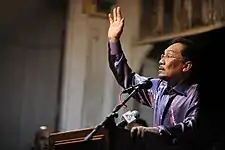
On 26 August 2008, Anwar won re-election in the Permatang Pauh by-election and returned to Parliament as Leader of the Opposition. He has stated the need for liberalisation, including an independent judiciary and free media, to combat the endemic corruption that he considers pushes Malaysia close to failed state status.[52]
Petition against Najib Razak
Anwar continued to attack Najib on his first day as prime minister, stating he found inconsistencies in the latter's decision to release 13 Internal Security Act (ISA) detainees. He said as long as the ISA existed, Barisan Nasional could still detain citizens at will.[53] In September 2011 Prime Minister Najib Razak acted to abolish the ISA and three other laws.[54] Some members of the opposition did not view this in a positive way.[55]
Attempts to form a majority coalition
Anwar has missed several deadlines he personally set for the transfer of power.[56] Anwar said he would need more time, and the recalibration of his message has not gone unnoticed: Deputy Prime Minister Najib Razak chose that day to initiate a broadband internet program Anwar opposes, saying that he had not doubted that the government would still be in office on 16 September.[57] Prime Minister Abdullah Badawi too pointed out that Anwar had missed his own deadline, and dismissed his claim to have secured the defection of 30 MPs.[58]
By 25 September, Anwar had still not amassed enough votes, creating doubts for Malaysians about whether he was really ready to take power,[59] particularly in light of his failure to meet his own 16 September deadline for the transition of power. In the interim, UMNO had its own party meeting[60][61] to broker Prime Minister Abdullah Ahmad Badawi's step down from power in June 2009, a year earlier than previously promised[62]
On 24 October 2008, Anwar admitted problems with his stalled bid to topple the UMNO's majority, saying that Pakatan Rakyat is running out of options to create a majority.[63] His "credibility among ordinary Malaysians has been somewhat dented after Sept 16 and the new promise of forming the Government has not generated the sort of anticipation or excitement as before."[64] Media within the country have taken an increasingly hostile view towards Anwar's protestations and failed threats to assemble a majority government.[65]
2013 general election
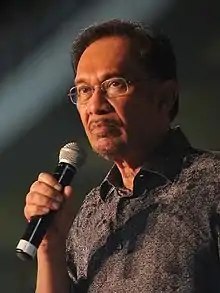
In the 2013 general election (GE13), Anwar Ibrahim, as the Leader of the Opposition, led his Pakatan Rakyat coalition (comprising the three parties DAP, PAS, and PKR) to contest in the election. On 25 February 2013, Pakatan Rakyat launched their manifesto titled The People’s Manifesto: Pakatan the hope of the people, pledging to reduce their financial burden, among other promises.[66][67] Anwar said that he would step down from politics if his team did not win the election. During an interview with Australian media he stated that "I will try my best. I am confident we will win. But if not, I will step down."[68]
.jpg.webp)
Pakatan Rakyat did not achieve the regime change target in the election despite obtaining 50.9% of the popular vote compared to the 47.4% gained by Barisan Nasional. This was attributed to the heavy malapportionment of the electoral districts.[69] Pakatan Rakyat also gained 7 more parliamentary seats compared to the 12th general election.
Anwar did not concede defeat, alleging widespread electoral fraud. Al Jazeera reported that Anwar Ibrahim came close to winning the election on 5 May 2013, but refused to admit defeat, and therefore also did not step down.[70] In an interview for ABC News (Australia), interviewer Jim Middleton suggested that Anwar Ibrahim was going to be the Lee Kuan Yew of the Malaysian opposition.[71][72] Anwar answered that he was not at that stage yet.
On 7 May 2013, Anwar Ibrahim vowed to lead a "fierce movement" to reform the country's electoral system and challenge the results of an election he lost.[73] On 8 May 2013, about 120,000 people wearing black gathered at Petaling Jaya Stadium, Kelana Jaya, Selangor, to attend a rally organised by Anwar to protest against the election results and demand a free and fair election.[74] The #Black505 movement continued for another 2 months with touring all over the country. A successful fundraising #Black505 dinner was held in Thean Hou Temple hall on 22 June 2013, hosted by Wangsa Maju MP Datuk Dr Tan Kee Kwong on behalf of PKR. Anwar Ibrahim immediately launched electoral petitions for over 30 disputed parliamentary seats in July 2013, but the cases were thrown off election court for technical reasons.[75]
Kajang Move
On 27 January 2014, the member of the Selangor State Legislative Assembly for Kajang, Lee Chin Cheh, resigned.[76] This triggered a by-election. A day later, Anwar Ibrahim was announced as Pakatan Rakyat candidate for the by-election.[77] Anwar's candidacy was originally to propel him to become Selangor's Menteri Besar.[78] Later, this move was known as the "Kajang Move".
This move, however, did not materialize as he was sentenced to five years' prison after Malaysia's Court of Appeal overturned his sodomy acquittal, causing Anwar to lose his qualification to be the state assembly candidate.[79] On 9 March 2014, PKR announced party president Dr Wan Azizah Wan Ismail as its new candidate for the Kajang by-election.[80] Anwar's Datuk Seri title was stripped by the Sultan of Selangor for "repeated questioning of the integrity" of the state's ruler during the subsequent crisis that saw the Sultan refuse to appoint Wan Azizah as Menteri Besar.[81] Anwar was able to continue using the "Datuk Seri" title because it had also been conferred on him by several other Malaysian states.[82]
Second sodomy conviction
2008 allegations of sodomy
On 29 June 2008, online news portal Malaysiakini reported that a male aide of Anwar, Saiful Bukhari Azlan, had lodged a police report claiming that he had been sodomised by Anwar.[83] Anwar said that the possibility of a prison sentence as a result of the allegations could be seen as an attempt to remove him from the leadership of the opposition following his growing support and by-election victories. He also reaffirmed his innocence and cited evidence in the form of medical reports.[52] In July 2008, he was arrested over allegations of sodomy again, but was acquitted of the charge in January 2012 by The High Court.[84] The presiding judge ruled that DNA evidence used in the case had been compromised and was unreliable.[85] The prosecution filed an appeal against the acquittal.[86] In March 2014 the appeal court over-ruled the high Court reinstating the conviction. The decision came as Anwar was preparing to contest a by-election on 23 March 2014 which he was expected to win. The conviction prevented him from standing. Human Rights Watch was critical of the decision, saying it was politically motivated.[87]
Two years later, The Court of Appeal overturned the acquittal by unanimously deciding that the High Court failed to "critically evaluate" the evidence submitted by government chemist Dr Seah Lay Hong.[88] As part of his overturned acquittal on 4 March 2014, Anwar was sentenced to five years in jail. Human Rights Watch and the International Commission of Jurists have accused the Malaysian government of meddling in this particular judicial matter and said the verdict was politically motivated.[89] On 10 February 2015, the Federal Court of Malaysia upheld the decision of the Court of Appeal and affirmed the five-year prison sentence. He was sent immediately to Sungai Buloh Prison, Selangor, to serve the sentence.[90]
Pakatan Harapan backbencher
Royal pardon and release
After the dissolution of the Pakatan Rakyat during his imprisonment, a new opposition coalition named the Pakatan Harapan was formed with Anwar as the de facto leader in absentia. The coalition had come into power by over-throwing Barisan Nasional in the 2018 general election (GE14). Following the formation of the new ruling government, Anwar was given a full royal pardon and was released from prison on 16 May 2018. He is designated to take over the reins from interim Prime Minister Mahathir Mohamad as planned and agreed by the coalition before GE14.[91][92] In an interview, he justified his reluctance to immediately step into power on the basis that Mahathir has appeared committed to the reform agenda, and doing a good job tackling a "disintegrating" political system. He also added that he was keen to travel and honour speaking engagements.[93] Anwar also indicated that he initially had reservations about Mahathir's "reconciliation efforts", but he eventually forgave his former enemy after Mahathir showed "compassion and concern which (Anwar) thought was absent in the past".
Return to politics and PD Move
Anwar contested in the Port Dickson by-election, dubbed as PD Move which was set to allow him to return to Parliament.[94] He won with an increased majority, albeit with a lower turnout, and returned to parliament again after 3 years of absence.
Sheraton Move and return to opposition
In late February 2020, the Pakatan Harapan government of Dr Mahathir Mohamad collapsed following defections by Anwar's deputy, Azmin Ali, and several PKR MP's aligned to him, along with the withdrawal of Bersatu from Pakatan Harapan. Mahathir promptly resigned from the premiership, as well as from his party, Bersatu. The political maneuvering has been labelled the "Sheraton Move", for the hotel in Petaling Jaya at which defecting MP's gathered with the opposition to show support for a new government.[95] Following the resignation of Mahathir, Anwar attempted to gather support for his appointment as Prime Minister. However, Bersatu president, Muhyiddin Yassin, was eventually appointed Prime Minister, with the support of a slender majority in the Dewan Rakyat.[96] Thus, Pakatan Harapan returned to the opposition benches, while Anwar was named Opposition Leader.[97]
Return to the Opposition (2020-)
While Muhyiddin formed a government under the auspices of a new coalition known as Perikatan Nasional, Mahathir attempted to regain his post with the help of his Pakatan allies. However, under Anwar's leadership, Keadilan refused to endorse Mahathir's bid for a third term as premier, claiming the nonagenarian had reneged on his repeated pledge to handover the office to Anwar.[98] Mahathir, in turn, refused to lend support to Anwar's candidacy, and instead nominated Sabah Chief Minister, Shafie Apdal, for the Prime Minister's post instead. Despite the support of allies DAP and Amanah for this compromise, Keadilan again rejected the proposal, and continued to propose Anwar as the coalition candidate.[99]
In September 2020, Anwar claimed to have gathered support from a "formidable" majority of MP's for his appointment as Prime Minister.[100]
Views and comments on various issues
External influence and interference through APCO in 1Malaysia claims
Anwar has made numerous remarks about a supposed conspiracy among the Malaysian government, APCO (a public relations firm retained by the Malaysian government), Israel, and the United States. Anwar has condemned the Malaysian government for seeking advice from APCO. He claims that the firm is linked to the "murder of Muslims in Palestine." He further claims to have given proof to a disciplinary committee of the Malaysian parliament, investigating his comments, that APCO is a front for the Israeli government. On another occasion, Anwar, speaking from the parliament, claimed that the firm was controlled by Jews and working on behalf of the American government to influence Malaysian foreign policy. He further implied that changes in Malaysian foreign policy could only be explained if Jews were manipulating Malaysia for the United States.[101]
On 22 April 2010 Anwar was censured by Malaysia's parliament for remarks he made during a press conference in parliament on 30 March 2010. During the press conference, Anwar claimed to have documents linking 1Malaysia with One Israel and the public relations firm APCO but refused to allow access to the documents when challenged.[102] The Malaysian government and APCO have both strongly denied Anwar's allegations. The censure motion passed by the House of Representatives referred Anwar's case to the Rights and Privileges Committee which will recommend a punishment for approval by the full chamber. Such punishment could include being banned from parliament.[103][104][105] However Anwar retaliated against the Malaysian government attacks by producing two documents to support his claims of links between APCO and 1Malaysia.[104][105]
Comments about Jewish people
In a press conference at the London School of Economics in March 2010, Anwar made comments about Zionists and "nasty Jews". In the press conference he also stated that, "There are good Jews, there are bad Jews, there are good Muslims and bad Muslims."[106]
In May 2010, B'nai B'rith International, a prominent Jewish human rights organisation, condemned Anwar in a letter to the United States Senate Committee on Foreign Relations, claiming that Anwar was a "purveyor of anti-Jewish hatred" and asked the American government to suspend all contact with Anwar.[107]
2012 Israeli-Palestinian Security comments
In an interview with The Wall Street Journal, Anwar Ibrahim stated, "I think our policy should be clear—protect the security [of Israel] but you must be as firm in protecting the legitimate interests of the Palestinians."[108]
This comment sparked an array of criticism from UMNO, one of the ruling party then. UMNO's MP Khairy Jamaluddin stated that Anwar's comments "show a blanket support for anything Israel does" and that "The issue of Palestine is a top foreign policy priority for my party, it would be an issue during the election year or otherwise… timing doesn’t matter.".[109]
Former Prime Minister Mahathir Mohammad then said he was not surprised by Anwar's comments, and stated with regard to Ibrahim's relationship with the Jewish community, "You can't be friendly with them and against them".[110]
Later, Anwar clarified his stand; he said that the remarks were consistent with the two-state solution adopted by the United Nations that is accepted by the Arab world, as well as Malaysia and Hamas.[111]
"I am issuing a stern warning to anyone trying to twist my statement just so that they can say that I have betrayed the aspirations of the Palestinian people", he said, continuing with stating that his party's stance "is to defend the rights of whoever it is that has been victimized".[109]
Views on gay marriage and homosexuality
In an interview with The Wall Street Journal, Anwar stated that while he opposes gay marriage and upholds the sanctity of marriage between men and women, laws on sodomy in Malaysia must be changed as they are "archaic".[112]
In an interview with British Broadcasting Corporation, Anwar reaffirmed his belief that marriage should remain between men and women. Clarifying his comments to The Wall Street Journal, Anwar maintained that he does not advocate legalising homosexuality or making gay marriage permissible—only that the laws should be amended to ensure private affairs are not penalised. "It is not my business to attack people or arrest people based on their sexual orientation," he said. "Morality is in the public sphere, not beyond that."[113]
Personal life
Anwar was born in Cherok Tok Kun, Penang.[114] His father, Ibrahim Abdul Rahman, started his career as a hospital porter, later to join politics as the UMNO Member of Parliament for Seberang Perai Central between 1959 and 1969 and also as the Parliamentary Secretary in the Ministry of Health from 1964 to 1969 until his defeat in the 1969 General Election by a candidate from Gerakan. His mother, Che Yan Hussein, was a housewife active in UMNO grassroots politics in Penang.[115] He undertook his secondary education at the Malay College Kuala Kangsar. He was educated at the University of Malaya, where he got Bachelor degree of Malay Studies,[116] and worked on his Masters in Literature through the National University of Malaysia while in prison from 1974 to 1975.[117]
He is married to former Deputy Prime Minister Wan Azizah Wan Ismail on 26 February 1980,[118] and they have five daughters and a son. His eldest daughter, Nurul Izzah Anwar, is also an MP for Permatang Pauh.[119]
| Anwar Ibrahim family tree | ||||||||||||||||||||||||||||||||||||||||||||||||||||||||||||||||||||||||||||||||||||||||||||||||||||||||||||||||||||||||||||||||||||||||||||||||||||||||||||||||||||||||||||||||||||||||||||||||||||||||||||||||||||||||||||||||||||||||||||||||||||||||||||||||||||||||||||||||||||||||||||||||||||||||||||||||||||||||||||||||||||||||
|---|---|---|---|---|---|---|---|---|---|---|---|---|---|---|---|---|---|---|---|---|---|---|---|---|---|---|---|---|---|---|---|---|---|---|---|---|---|---|---|---|---|---|---|---|---|---|---|---|---|---|---|---|---|---|---|---|---|---|---|---|---|---|---|---|---|---|---|---|---|---|---|---|---|---|---|---|---|---|---|---|---|---|---|---|---|---|---|---|---|---|---|---|---|---|---|---|---|---|---|---|---|---|---|---|---|---|---|---|---|---|---|---|---|---|---|---|---|---|---|---|---|---|---|---|---|---|---|---|---|---|---|---|---|---|---|---|---|---|---|---|---|---|---|---|---|---|---|---|---|---|---|---|---|---|---|---|---|---|---|---|---|---|---|---|---|---|---|---|---|---|---|---|---|---|---|---|---|---|---|---|---|---|---|---|---|---|---|---|---|---|---|---|---|---|---|---|---|---|---|---|---|---|---|---|---|---|---|---|---|---|---|---|---|---|---|---|---|---|---|---|---|---|---|---|---|---|---|---|---|---|---|---|---|---|---|---|---|---|---|---|---|---|---|---|---|---|---|---|---|---|---|---|---|---|---|---|---|---|---|---|---|---|---|---|---|---|---|---|---|---|---|---|---|---|---|---|---|---|---|---|---|---|---|---|---|---|---|---|---|---|---|---|---|---|---|---|---|---|---|---|---|---|---|---|---|---|---|---|---|---|---|---|---|---|---|---|---|---|---|---|---|---|---|---|---|---|---|---|
| ||||||||||||||||||||||||||||||||||||||||||||||||||||||||||||||||||||||||||||||||||||||||||||||||||||||||||||||||||||||||||||||||||||||||||||||||||||||||||||||||||||||||||||||||||||||||||||||||||||||||||||||||||||||||||||||||||||||||||||||||||||||||||||||||||||||||||||||||||||||||||||||||||||||||||||||||||||||||||||||||||||||||
Awards and recognitions
Honours of Malaysia
 Pahang :
Pahang :
 Grand Knight of the Order of Sultan Ahmad Shah of Pahang (SSAP) – Dato' Sri (1990)
Grand Knight of the Order of Sultan Ahmad Shah of Pahang (SSAP) – Dato' Sri (1990)
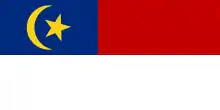 Malacca :
Malacca :
 Grand Commander of the Order of Malacca (DGSM) – Datuk Seri (1991)
Grand Commander of the Order of Malacca (DGSM) – Datuk Seri (1991)
.svg.png.webp) Penang :
Penang :
 Companion of the Order of the Defender of State (DMPN) – Dato' (1991)
Companion of the Order of the Defender of State (DMPN) – Dato' (1991) Knight Grand Commander of the Order of the Defender of State (DUPN) – Dato' Seri Utama (1994)
Knight Grand Commander of the Order of the Defender of State (DUPN) – Dato' Seri Utama (1994)
 Negeri Sembilan :
Negeri Sembilan :
 Principal Grand Knight of the Order of Loyalty to Negeri Sembilan (SPNS) – Dato' Seri Utama (1994)
Principal Grand Knight of the Order of Loyalty to Negeri Sembilan (SPNS) – Dato' Seri Utama (1994)
 Sabah :
Sabah :
 Grand Commander of the Order of Kinabalu (SPDK) – Datuk Seri Panglima (1994)
Grand Commander of the Order of Kinabalu (SPDK) – Datuk Seri Panglima (1994)
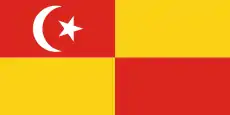 Selangor :
Selangor :
 Knight Grand Companion of the Order of Sultan Salahuddin Abdul Aziz Shah (SSSA) – Dato' Seri (1992,
Knight Grand Companion of the Order of Sultan Salahuddin Abdul Aziz Shah (SSSA) – Dato' Seri (1992,
 Perak :
Perak :
.svg.png.webp) Grand Knight of the Order of Cura Si Manja Kini (SPCM) – Dato' Seri (1995)
Grand Knight of the Order of Cura Si Manja Kini (SPCM) – Dato' Seri (1995)
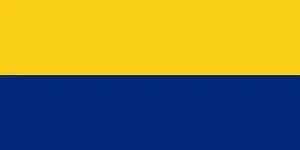 Perlis :
Perlis :
- Knight Grand Companion of the Order of the Gallant Prince Syed Putra Jamalullail (SSPJ) – Dato' Seri Diraja (1995)
Election results
| Year | Constituency | Votes | Pct | Opponent(s) | Votes | Pct | Ballots cast | Majority | Turnout | |||
|---|---|---|---|---|---|---|---|---|---|---|---|---|
| 1982 | P41 Permatang Pauh, Penang | Anwar Ibrahim (UMNO) | 18,849 | 74.88% | Zabidi Ali (PAS) | 4,497 | 17.90% | 25,885 | 14,352 | Unknown | ||
| Tan Ah Huat (DAP) | 1,825 | 7.25% | ||||||||||
| 1986 | Anwar Ibrahim (UMNO) | 17,979 | 70.56% | Mohamad Sabu (PAS) | 7,500 | 29.44% | 26,098 | 10,479 | 74.82% | |||
| 1990 | Anwar Ibrahim (UMNO) | 23,793 | 75.69% | Mahfuz Omar (PAS) | 7,643 | 24.31% | 31,740 | 16,150 | 78.32% | |||
| 1995 | P44 Permatang Pauh, Penang | Anwar Ibrahim (UMNO) | 27,945 | 76.08% | Abdul Rahman Manap (DAP) | 4,715 | 12.84% | 37,618 | 23,230 | 78.79% | ||
| Mazani Abdullah (PAS) | 4,071 | 11.08% | ||||||||||
| 2008 | Anwar Ibrahim (PKR) | 31,195 | 66.64% | Arif Shah Omar Shah (UMNO) | 15,524 | 33.16% | 47,258 | 15,671 | 80.84% | |||
| Hanafi Mamat (AKIM) | 92 | 0.20% | ||||||||||
| 2013 | Anwar Ibrahim (PKR) | 37,090 | 58.56% | Mazlan Ismail (UMNO) | 25,369 | 40.06% | 63,332 | 11,721 | 88.33% | |||
| Abdullah Zawawi Samsudin (Ind) | 201 | 0.32% | ||||||||||
| 2018 | P132 Port Dickson, Negeri Sembilan | Anwar Ibrahim (PKR) | 31,016 | 71.32% | Mohd Nazari Mokhtar (PAS) | 7,456 | 17.14% | 43,489 | 23,560 | 58.25% | ||
| Mohd Isa Abdul Samad (Ind) | 4,230 | 9.73% | ||||||||||
| Stevie Chan Keng Leong (Ind) | 337 | 0.78% | ||||||||||
| Lau Seck Yan (Ind) | 214 | 0.49% | ||||||||||
| Kan Chee Yuen (Ind) | 154 | 0.35% | ||||||||||
| Saiful Bukhari Azlan (Ind) | 82 | 0.19% | ||||||||||
See also
References
- "Anwar disqualified as MP since Mar 16, says speaker". The Malaysian Times. 1 April 2015. Retrieved 3 April 2015.
- "Anwar Ibrahim". Encyclopaedia Britannica. Retrieved 26 November 2019.
- "Mahathir named chairman, Anwar named de facto leader of Pakatan Harapan".
- Ellis-Petersen, Hannah (11 May 2018). "Malaysia: Mahathir Mohamad says Anwar Ibrahim to be given royal pardon". The Guardian. Retrieved 11 May 2018.
- "Malaysia's jailed political leader Anwar Ibrahim to be released on May 16". Strait Times. 13 May 2018. Retrieved 13 May 2018.
- Ellis-Petersen, Hannah (16 May 2018). "Malaysia: Anwar Ibrahim released from prison". The Guardian. Retrieved 16 May 2018.
- "Ibrahim, Anwar – Oxford Islamic Studies Online". www.oxfordislamicstudies.com. Retrieved 16 May 2018.
- "Archived copy". Archived from the original on 26 January 2018. Retrieved 25 December 2016.CS1 maint: archived copy as title (link)
- "IIIT Vice President Visits IIUM and Attends World Conference". International Institute of Islamic Thought (IIIT). Archived from the original on 26 December 2016. Retrieved 16 May 2018.
- "Anwar Ibrahim Reflects on the Aftermath of the Arab Spring". International Institute of Islamic Thought (IIIT). Archived from the original on 1 October 2017. Retrieved 16 May 2018.
- "TIME Chooses Anwar Ibrahim Among the Top 100". International Institute of Islamic Thought (IIIT). Archived from the original on 1 October 2017. Retrieved 16 May 2018.
- "International Islamic University Malaysia". Archived from the original on 12 October 2014. Retrieved 10 February 2015.
- Growing popularity of conservative Islam in Malaysia linked to overseas students South China Morning Post, 2 April 2015
- "Development Committee – Former Chairmen of the Development Committee". The World bank. Retrieved 10 February 2015.
- "Mahathir Returns After Two Months Holiday" (PDF). Bernama. 22 July 1997.
- Roger Mitton (30 November 2000). "A Day in the Life". Asiaweek.
- O'Brien, Timothy L. (6 December 1998). "soros public enemy&st=cse&pagewanted=1". The New York Times. Retrieved 9 January 2012.
- "Judge gives reasons for ruling in favour of Anwar". Daily Express. UK. 26 January 2005. Archived from the original on 21 June 2011. Retrieved 3 February 2010.
- Hartcher, Peter (23 February 2010). "Outdated political thuggery embarrasses Malaysia". The Sydney Morning Herald.
- "Apology ends Anwar's suit over beating". nytimes.com. 4 August 2005. Retrieved 11 January 2012.
- "Archived copy". Archived from the original on 20 August 2018. Retrieved 20 August 2018.CS1 maint: archived copy as title (link)
- Alvin Ung CBS-489A Stain Upon Anwar's Defense, The Associated Press (via CBS News). 30 December 1998
- Anwar trial hears DNA evidence 30 December 1998, BBC News
- "Anwar Ibrahim". 6 June 2014. Archived from the original on 13 February 2015. Retrieved 10 February 2015.
- Canadian Lawyers Defend the Independence of the Bar in Malaysia
- Specialist Speakers Profile. "Anwar Ibrahim". Retrieved 10 February 2015.
- "Archives". Retrieved 10 February 2015.
- "Anwar vs Dr M: Two of three judges recuse themselves (Updated)". The Star. 1 March 2010. Retrieved 1 March 2010.
- "Court to allow Anwar appeal". BBC News. 7 September 2004. Retrieved 14 January 2012.
- "What is RM100 million?". Malaysian Insider. 28 May 2009. Archived from the original on 15 July 2009. Retrieved 30 January 2010.
- "Court: Anwar's sacking from cabinet posts is valid". Malay Mail. 8 March 2010. Archived from the original on 9 March 2010. Retrieved 8 March 2010.
- "Anwar's Sacking From Cabinet Posts In 1998 Is Valid, Federal Court Rules". Bernama. 8 March 2010. Retrieved 8 March 2010.
- "Update Anwar's sacking was lawful, rules Federal Court". TheEdge. 8 March 2010. Archived from the original on 26 April 2010. Retrieved 8 March 2010.
- Anwar Ibrahim "Archived copy". Archived from the original on 29 November 2011. Retrieved 29 July 2011.CS1 maint: archived copy as title (link)
- "AccountAbility". Retrieved 16 July 2008.
- "Foundation for the Future Holds its First Board Meeting in Doha, Qatar". Archived from the original on 16 June 2007. Retrieved 10 October 2008.. Foundation for the Future. 15 July 2006
- Ethics Committee Case No2 and President's Paper, p.102, 2 June 2005, World Bank
- Malaysia's Anwar Says He Plans to Run for Parliament. 30 November 2006, Bloomberg.
- Wan Azizah declares she is Anwar proxy. 25 February 2008. Channel NewsAsia
- "When Mahathir lashes out at Anwar, will it catch fire?" Archived 25 May 2008 at the Wayback Machine 31 March 2008, The Malaysian Insider.
- "Malaysian opposition leader Anwar marks end of political ban" Archived 25 May 2014 at the Wayback Machine, AFP, 14 April 2008.
- Malaysia Police Halt Anwar Speech, AFP (via FoxNews), 14 April 2008.
- Malaysia's Anwar returns to Parliament, Associated Press, 29 April 2008.
- "Malaysian government declares by-election defeat to Anwar". Thestandard.com.hk. 26 March 2008. Archived from the original on 20 December 2011. Retrieved 9 January 2012.
- "Malaysia's Anwar wins Parliament seat". Pr-inside.com. Archived from the original on 17 February 2012. Retrieved 9 January 2012.
- "Malaysia's Anwar wins seat in parliament". Archived from the original on 29 August 2008. Retrieved 26 August 2008.. ap.google.com. 26 August 2008
- Malaysia's Anwar returns to parliament. AFP Google. 27 August 2008
- Aziz, Faisal (28 August 2008). "NEWSMAKER – Malaysia Anwar sworn in, ends political exile". In.reuters.com. Retrieved 9 January 2012.
- "afp.google.com/article, Malaysia's Anwar returns to parliament". AFP Google. 27 August 2008. Retrieved 9 January 2012.
- theedgedaily.com, 28 August 2008: Anwar sworn in, appointed as Opposition Leader Archived 28 July 2013 at the Wayback Machine
- "Anwar rejoins Malaysia parliament, heads opposition". Reuters (via Express India). 28 August 2008. Retrieved 28 August 2008.
- "Interview with Anwar Ibrahim". The Diplomat. Retrieved 9 January 2012.
- "Anwar still finds Najib wanting". The Malaysian Insider. 4 April 2009. Archived from the original on 20 September 2013. Retrieved 4 April 2009.
- "PM announces repeal of ISA, three Emergency proclamations", The Star, 15 September 2011. Retrieved on 3 May 2013.
- News."Ex-ISA detainee held under new security law", The Star 7 February 2013. Retrieved on 3 April 2013
- "Anwar fails to form next Government". Asia This Week. 16 September 2008. Archived from the original on 25 January 2016. Retrieved 16 September 2008.
- "No change in govt, says Najib". The Star. 16 September 2008. Archived from the original on 16 September 2008. Retrieved 16 September 2008.
- "Malaysian PM calls opposition bluff". Al Jazeera English. 16 September 2008. Retrieved 16 September 2008.
- "Anwar Out of Steam?". New Strait Times. 25 September 2008. Archived from the original on 28 October 2008. Retrieved 29 September 2008.
- "Malaysia's ruling party set to discuss PM's future". Radio Australia. Australian Broadcasting Corporation. 25 September 2008. Archived from the original on 26 September 2008. Retrieved 29 September 2008.
- "Umno meets tomorrow on transition". The Malaysian Insider. 25 September 2008. Archived from the original on 28 September 2008. Retrieved 29 September 2008.
- "Source says Malaysia PM may step down early". Reuters UK. 25 September 2008. Retrieved 29 September 2008.
- "Anwar: No hurry to take over govt". The New Straits Times Online. 24 October 2008. Archived from the original on 22 May 2019. Retrieved 24 October 2008.
- "Still waiting in the wings". The Star. 9 November 2008. Retrieved 9 November 2008.
- "Dewan dispatches: Anwar Ibrahim's obsession with Najib the 'Dictator' may be good for the nation". Voice of Malaysian. 12 November 2008. Archived from the original on 21 July 2013. Retrieved 13 November 2008.
- "Manifesto to curb monopolies, spur economy". Retrieved 10 February 2015.
- "Manifesto Pakatan Harapan Rakyat 2013 Summary" (PDF). Retrieved 16 May 2018.
- "Malaysia's Anwar to retire if he loses next polls". 18 August 2012. Retrieved 16 May 2018.
- Pakatan lost, but not defeated Archived 10 May 2013 at the Wayback Machine
- "Profile: Anwar Ibrahim", Kuala Lumpur, 6 May 2013. Retrieved on 10 May 2013.
- "Extended Interview: Anwar Ibrahim", ABC News (Australia), Kuala Lumpur, 8 May 2013. Retrieved on 10 May 2013.
- "YouTube". www.youtube.com. Retrieved 16 May 2018.
- Siva Sithraputhran."Pakatan to hold rally tomorrow against 'polls fraud'", Malaysiakini, 7 May 2013. Retrieved on 10 May 2013.
- "120,000 show of force at post-GE13 rally". Malaysiakini. 8 May 2013. Retrieved 10 May 2013.
- DR AHMAD ZAHARUDDIN SANI AHMAD SABRI. "Apa Yang Telah Kita Pelajari Dari Petisyen Pilihan Raya..." Archived from the original on 10 December 2013. Retrieved 10 February 2015.
- "Archived copy". Archived from the original on 30 January 2014. Retrieved 30 January 2014.CS1 maint: archived copy as title (link)
- http://www.channelnewsasia.com/news/asiap%7Cacific/anwar-ibrahim-named-pkr/970716.html%5B%5D
- http://www.malaysia-chronicle.com/index.php?option=com_k2&view=item&id=219992:mb-khalid-announces-anwar-ibrahim-as-the-pkr-candidate-for-kajang-seat&Itemid=2#axzz2rqnBByU3
- "Anwar Ibrahim sentenced to five years' prison after Malaysia's court of appeal overturns sodomy acquittal". Australia Network News. Retrieved 10 February 2015.
- "Wan Azizah to replace Anwar in Kajang". Retrieved 10 February 2015.
- "Selangor Sultan strips Anwar of 'Datuk Seri' title over MB crisis". Retrieved 10 February 2015.
- "Selangor Sultan revokes Anwar's 'Datuk Seri' title". Astro Awani. 4 December 2014. Retrieved 5 December 2014.
- "Aide alleges sodomy: Report lodged". Malaysiakini. Mkini Dotcom Sdn Bhd. 28 June 2008. Retrieved 28 June 2008.
-
- "Anwar Ibrahim found not guilty of sodomy". Aljazeera. 9 January 2012. Retrieved 9 January 2012.
- "Malaysia court finds Anwar Ibrahim not guilty of sodomy". BBC News Asia. 9 January 2011. Retrieved 9 January 2012.
- Shazwan Mustafa Kamal (20 January 2012). "Prosecution appeals Anwar sodomy acquittal". The Malaysian Insider. Archived from the original on 22 January 2012. Retrieved 20 January 2012.
- "Court rules Malaysian opposition leader guilty of sodomizing aide". Malaysia News.Net. Archived from the original on 8 March 2014. Retrieved 8 March 2014.
- "Anwar given 5 years' jail after appellate court reverses sodomy acquittal". Retrieved 10 February 2015.
- "Malaysia Judiciary Criticized Over Anwar Ibrahim Verdict". VOA. Retrieved 10 February 2015.
- "ANWAR GUILTY". Archived from the original on 10 February 2015. Retrieved 10 February 2015.
- "Anwar Ibrahim freed from prison after royal pardon from Malaysian king". Retrieved 16 May 2018.
- "Anwar hails 'new dawn for Malaysia' following release from prison". Retrieved 16 May 2018.
- "Mahathir 'compassionate', Najib's fall from grace 'karma', says Anwar". Channel NewsAsia. Retrieved 5 June 2018.
- "Anwar Ibrahim to contest vacated Port Dickson seat". Channel NewsAsia. Retrieved 13 September 2018.
- Ratcliffe, Rebecca (25 February 2020). "Malaysia's political turmoil: everything you need to know". Guardian. Retrieved 24 September 2020.
- Ong, Justin (2 March 2020). "Ex-PMO officer breaks down the 'Sheraton Move'". Malay Mail. Retrieved 24 September 2020.
- "Pakatan officially names Anwar opposition leader". Today Online. 7 May 2020.
- Razak, Radzi (29 May 2020). "Anwar: Pakatan won't make same 'mistake' when choosing next PM". Malay Mail. Retrieved 24 September 2020.
- "Reject deceitful politics, Anwar posts after Shafie for PM announcement". Malaysiakini. 27 June 2020. Retrieved 24 September 2020.
- "Anwar claims "strong majority"". The Star. 24 September 2020. Retrieved 24 September 2020.
- The reversal of Anwar Ibrahim Archived 6 May 2010 at the Wayback Machine, The New Ledger, 10 April 2010
- "Parliament: Anwar claims Apco was in M'sia before 1Malaysia concept was announced, The Star, 30 March 2010". Thestar.com.my. Archived from the original on 2 April 2010. Retrieved 9 January 2012.
- Ahmad, Razak (22 April 2010). "Malaysia parliament votes to censure Anwar". In.reuters.com. Retrieved 9 January 2012.
- Apco: Anwar produces documents, exposes shady clients Archived 22 August 2012 at the Wayback Machine. Harakahdaily. 30 March 2010
- Hazlan Zakaria & S Pathmawathy. "Anwar produces documents on APCO-Israel-1M'sia link, Malaysiakini". Malaysiakini.com. Retrieved 9 January 2012.
- "Press Conference at the London School of Economics (LSE) 18 March 2010". Youtube. Retrieved 9 January 2012.
- "B'nai B'rith International – The Global Voice of the Jewish Community". Bnaibrith.org. 25 May 2010. Archived from the original on 7 January 2012. Retrieved 9 January 2012.
- "War of words between Malaysian opposition leader and ministers over Israel", Malaysia today, 2012, archived from the original on 3 July 2013.
- Mahtani, Shibani (31 January 2012). "Israel Dominates the Debate in Malaysia – Again". The Wall Street Journal. Retrieved 1 February 2012.
- "Dr. M: Anwar does not think of the welfare of Palestinians". New Straits Times. 31 January 2012. Archived from the original on 1 February 2012. Retrieved 1 February 2012.
- Ibrahim, Anwar. "Hamas Leader Calls for Two-State Solution, But Refuses to Renounce Violence". Blog. Archived from the original on 11 February 2015. Retrieved 10 February 2015.
- Mahtani, Shibani. "Malaysia's Anwar Presses On Despite Appeal", "The Wall Street Journal", New York, 26 January 2013, Retrieved on 29 January 2013.
- Shibani Mahtani. "Anwar Clarifies His Views on Malaysia's Sodomy Laws". WSJ. Retrieved 10 February 2015.
- 07 Ogos 2008, "Mampukah Anwar membuat 'come-back'?" Hafizah Kamarudin, Bernama
- Alias Muhammad (1994), p. 177
- TIME Chooses Anwar Ibrahim Among The Top 100
- Allers, Charles, The Evolution of a Muslim Democrat: The Life of Malaysia's Anwar Ibrahim (New York: Peter Lang, 2013), 57.
- "Anwar and Wan Azizah – 39 years of marriage and still going strong". The Star. 26 February 2019.
- Anwar verdict The Star. 10 February 2015.
- "Keputusan Pilihan Raya Umum Parlimen/Dewan Undangan Negeri" (in Malay). Election Commission of Malaysia. Retrieved 4 February 2017. Percentage figures based on total turnout.
- "Malaysia General Election". undiinfo Malaysian Election Data. Malaysiakini. Retrieved 4 February 2017. Results only available from the 2004 election.
- "KEPUTUSAN PILIHAN RAYA UMUM 13". Sistem Pengurusan Maklumat Pilihan Raya Umum. Election Commission of Malaysia. Retrieved 24 March 2017.
Other references
- Kamarudin, Raja Petra (7 November 2005). "The stuff politicians are made of". Malaysia Today. Archived from the original on 23 January 2008. Retrieved 17 July 2008.
- Kamarudin, Raja Petra (9 November 2005). "The Anwar Factor". Malaysia Today. Archived from the original on 14 January 2008. Retrieved 17 July 2008.
- Yeoh, Oon (6 December 2005). "The return of Anwar Ibrahim". Malaysia Today. Archived from the original on 5 June 2008. Retrieved 17 July 2008.
- Shari, Izatun (30 June 2008). "Najib denies involvement in Anwar sodomy allegation". The Star. Archived from the original on 3 July 2008. Retrieved 17 July 2008.
- "Anwar challenges PM and DPM to debate on fuel prices". The Star. 6 June 2008. Archived from the original on 9 July 2008. Retrieved 17 July 2008.
Bibliography
- Alias Muhammad, PAS' Platform: Development and Change, 1951-1986, Gateway Publishing House, 1994, ISBN 9677500236
- Charles Allers, The Evolution of a Muslim Democrat: The Life of Malaysia's Anwar Ibrahim, Peter Lang, 2013, ISBN 9781433123566
- Moktar Petah, Kerajaan mansuh kekebalan Raja Melayu, ART Media, 1993, ISBN 9839835009
External links
| Wikimedia Commons has media related to Anwar Ibrahim. |
| Wikiquote has quotations related to: Anwar Ibrahim |
| Party political offices | ||
|---|---|---|
| Preceded by Shuhaimi Kamarudin |
Leader of the United Malays National Organisation Youth Branch 1982–1987 |
Succeeded by Najib Razak |
| Preceded by Ghafar Baba |
Deputy President of the United Malays National Organisation 1993–1998 |
Vacant Title next held by Abdullah Ahmad Badawi |
| Preceded by Wan Azizah Wan Ismail |
Leader of the People's Pact 2008–2015 |
Position abolished |
| New office | Leader of the Alliance of Hope 2017–present |
Incumbent |
| Parliament of Malaysia | ||
| Preceded by Zabidi Ali |
Member of the Dewan Rakyat for Permatang Pauh 1982–1999 |
Succeeded by Wan Azizah Wan Ismail |
| Preceded by Wan Azizah Wan Ismail |
Member of the Dewan Rakyat for Permatang Pauh 2008–2015 | |
| Preceded by Danyal Balagopal Abdullah |
Member of the Dewan Rakyat for Port Dickson 2018– |
Succeeded by Incumbent |
| Political offices | ||
| Preceded by Mokhtar Hashim |
Minister of Culture, Youth and Sports 1983–1984 |
Succeeded by Sulaiman Daud |
| Preceded by Manan Osman |
Minister of Agriculture 1984–1986 |
Succeeded by Sanusi Junid |
| Preceded by Abdullah Ahmad Badawi |
Minister of Education 1986–1991 |
Succeeded by Sulaiman Daud |
| Preceded by Daim Zainuddin |
Minister of Finance 1991–1998 |
Succeeded by Mahathir Mohamad |
| Preceded by Ghafar Baba |
Deputy Prime Minister of Malaysia 1993–1998 |
Vacant Title next held by Abdullah Ahmad Badawi |
| Preceded by Wan Azizah Wan Ismail |
Leader of the Opposition 2008–2015 |
Succeeded by Wan Azizah Wan Ismail |
| Academic offices | ||
| Preceded by Hussein Onn |
President of International Islamic University Malaysia 1988–1998 |
Succeeded by Najib Razak |

